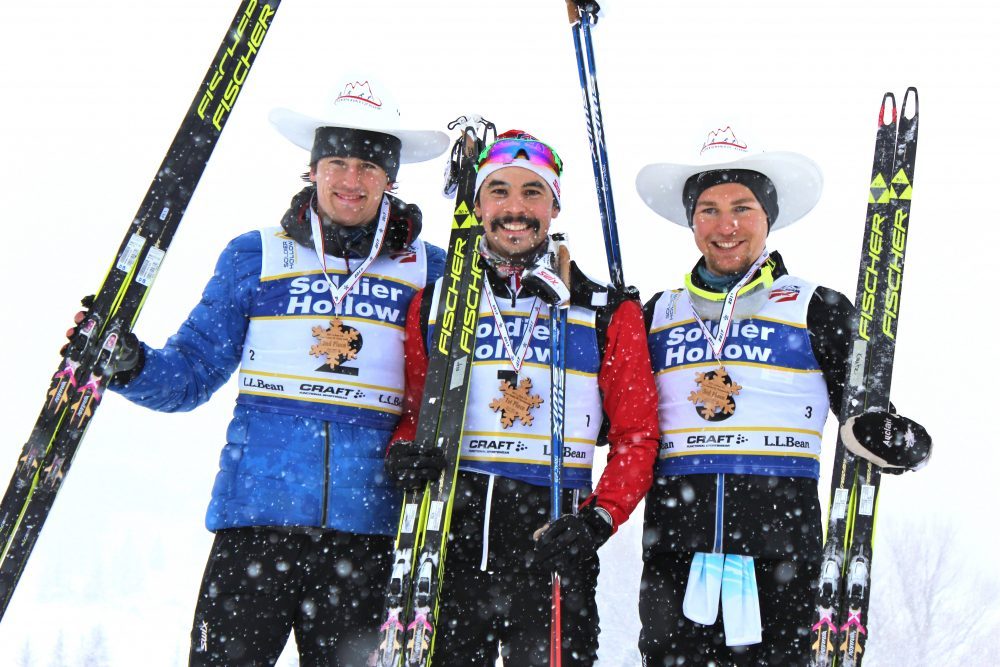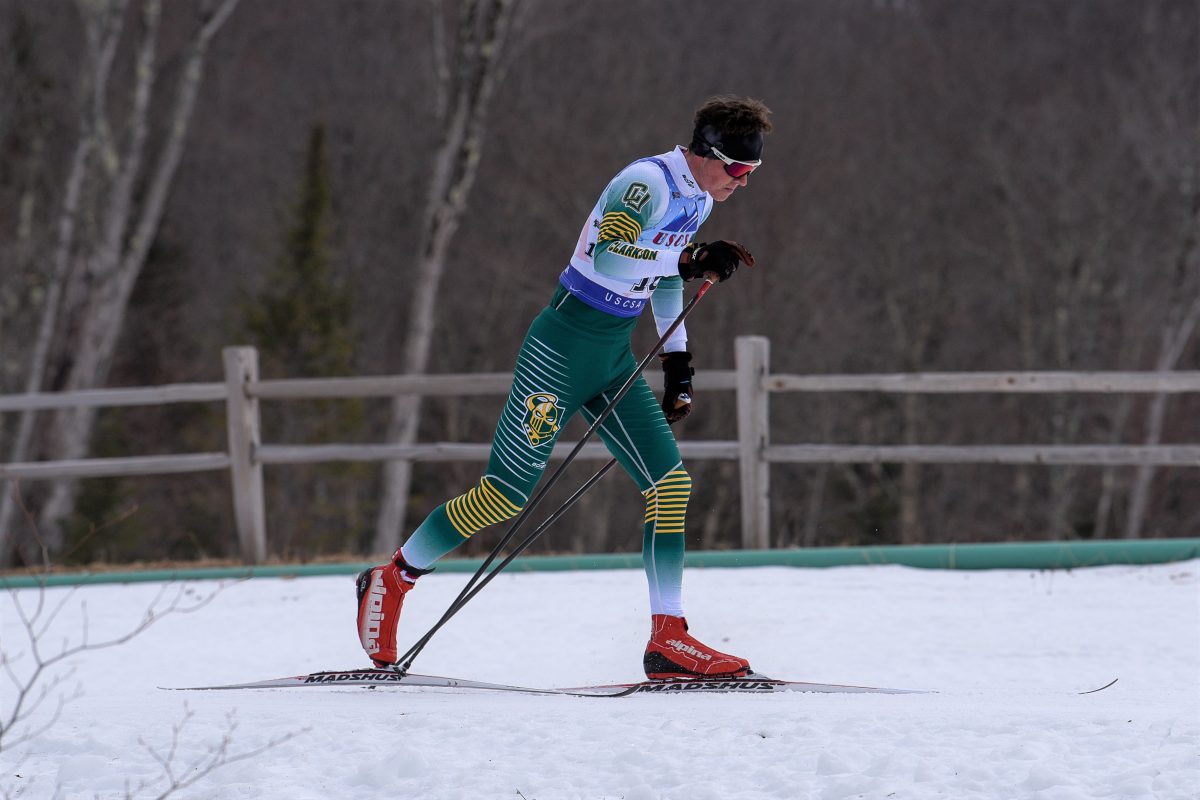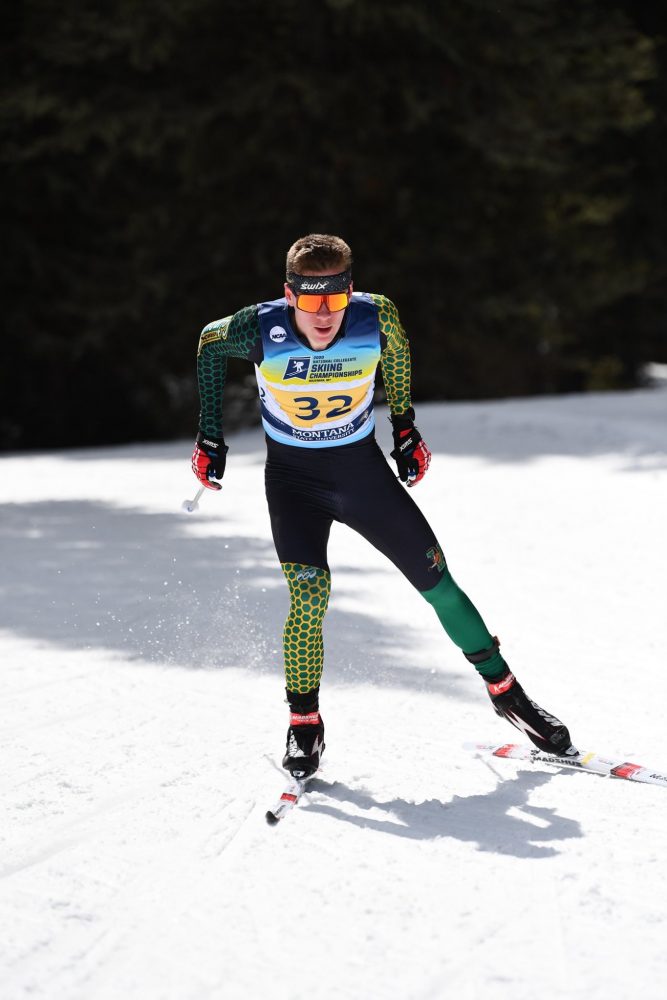
Last Olympics, the first for Canadian cross-country skier Jesse Cockney, went almost exactly wrong.
In Sochi, Russia, Cockney slumped to 53rd in the sprint — his signature event — missing the heats by 6.5 seconds in a lighter field than many World Cups (at the Olympics, no country can enter more than four athletes).
“I honestly believed I would be better — I didn’t imagine I would be that far behind,” Cockney said in an interview with FasterSkier last month. “I had great races at the [Olympic] trials in Canmore. After the training camp we did, we raced the World Cup in Toblach [Italy], and that was by far the best distance race I ever had. The trend was in the right direction to perform at the Olympics.”
It wasn’t a necessarily psychological flake-out, stage fright, or anything like that. Cockney has numbers, and he knows that something in his training and peaking just didn’t add up back in 2014.

“We have blood tests we do before competitions,” he explained. “That was probably the seven-year low for all of my blood numbers, coming into those races two days before the sprint. So something was pretty missed in terms of the physiological preparation for Sochi, and it totally reflected itself in the race results and the feelings.”
Coming into 2018, Cockney has already met Cross Country Canada’s qualification criteria for the Olympics in PyeongChang, South Korea. And he’s looking for different results this time, different feelings.
“I’ve had four years to learn, and I hope we learned,” he said.
Nearing the halfway point of last season, it didn’t seem at all obvious that Cockney would end the year qualified for PyeongChang. Cockney only finished two World Cup races before the Christmas break, with a top finish of 78th in the 15 k classic in Ruka, Finland.
That’s a far cry from the top 30’s, top 16’s, and top 6’s that are needed for Cross Country Canada’s various levels of qualification criteria.
“It was a comedy of errors last year,” Cockney admitted. “The fitness than the results would show. Some of the external factors I let play into the results too much. The race in Kuusamo, there was a snowstorm before the sprint, which threw me off. In Davos, I fell in the qualifier. So I have no idea what that day would have looked like.”
But he secured start rights for the World Cups in PyeongChang, which served as a preview of the Olympic courses. Because the travel was so substantial in the middle of the season and just a few weeks before World Championships, many top athletes didn’t attend the races. Cockney knew he had an opening for top results.
“Very often my often my strength is skiing in the heats and finding opportunities and openings in the heats,” he explained. “It’s very difficult for me to get into the heats. So I knew I really wanted to take advantage of being in the heats.”

Cockney qualified 16th and then won his quarterfinal. He ended up 10th on the day, halfway to the two top-16 sprint results he would need to make the Olympic team.
His season continued with a trip to World Championships, where he finished 47th.
“Last year basically every single race I did was a trials for the next race,” he said. “I was pretty much always hearing from the coaching staff before a weekend that if I didn’t do well this weekend I wouldn’t get to start next weekend, or if I don’t do well here I won’t get to go to World Champs, or something else. It just became that every day was racing for something else and not actually being present.”
That changed when Cockney came home to compete in World Cup Finals in Quebec, the last World Cups of the season. But he didn’t feel great.
“I was quite tired by the end of the World Cup season,” he admitted. “Actually, the intensity before we left Canmore to go to Quebec at the end of the season, it was probably the worst intensity that I did all year. Ivan [Babikov] and I were doing a workout together in Canmore and I couldn’t finish the workout — I was so tired, I had no energy in my legs. I guess I was a little apprehensive going into the World Cups in Quebec.”
Cockney found some magic, though, qualifying 28th in the sprint, and taking second in his quarterfinal in a photo finish with Norway’s Johannes Høsflot Klæbo, who later that day became the Sprint Cup winner based on a season of World Cup success.
At the end of the day, Cockney was 10th again, and had made the Olympic criteria.

“On the day, my legs were feeling good, and it’s a course that I like, with the long flowing speed sections and a big high-speed finish around the corner,” he said.
Having hit those criteria and secured World Cup starts for next season as well, Cockney is looking forward to having a very different perspective on his upcoming races.
“That’s a pretty big bonus for Period I and the rest of the year,” he said of being qualified. “I can just race. And that’s pretty often when people’s best results come, when they are just present and focused on the day.”
When Cockney gets to PyeongChang, he will have an advantage many top athletes will lack: prior experience at the venue. Just a handful of men’s sprinters who competed in the PyeongChang World Cups are expected to make their countries’ Olympic teams (Cockney’s teammate Len Valjas is another one of them).
“Nothing really compares to being there,” Cockney said of the decision to take the travel. “I think that was really valuable to get a chance to go and see the courses first hand, to see what it’s like to have a sustained climb – the last climb is quite difficult. It’s hard to tell on the video but it’s quite steep. So I’m pretty happy that I was able to see the course.”
Building towards the Olympic season, that preview has allowed Cockney to keep a laser focus on the PyeongChang sprint.
“I have a loop in Camore on the World Cup trails that I’ve kind of adopted,” he explained. “Mentally it is the Olympic course in PyeongChang. I do most of my warmups for the strength sessions running and ski bounding on that section, and visualizing that I’m not in Canmore, that I’m in Korea skiing on snow and finding the best lines. Just trying to picture myself on those climbs, and hopefully mentally getting more and more confident and comfortable.”

That’s one thing Cockney is doing to look towards Olympic success. Another is learning from whatever got him to a physiological low in Sochi.
“I will spend less time at altitude before these Olympics,” he said. “And take a big step back in terms of training volume and intensity, and make sure that I’m rested and that my body isn’t in that recovery panic mode that it was in Sochi.”
So far, training this year has been nothing out of the ordinary, just a continuation of the plan that got him here.
“I think I’ve just been patient with the training,” Cockney explained. “It has been pretty steady. We haven’t had many highs or lows with anything. I’m letting the bulk of the training year build towards February.”
Getting better at sprint qualifiers is also a goal, so that he can have more opportunities to find good lines in the heats.
“Over the last two years I’ve been trying to get back to training a bit more volume, trying to get some capacity in a different way,” he said. “I [need to] have the stamina to ski at a high speed in the qualifier, not just for 30 or 45 seconds well, but I have to be strong for 3 ½ minutes in a qualifier. And that comes for sure just from capacity and I’m trying to work on that.”
Cockney went to Italy for a national team camp, but other than that it has been a lot of training in Canmore, the adopted home of the Yellowknife, Northwest Territories, native.
He is not part of a National Development Training Center, and instead has been training primarily with the other Canmore-based members of the national team.
“We can be our own team with Lenny, Knute [Johnsgaard], Graeme [Killick], and myself,” Cockney said. “[World Cup coach] Ivan [Babikov] is there for all the workouts we need to go. We have a good small group so that means we are pretty flexible… I’d say every workout there’s someone who is strong and can pace the group and make sure that there’s high-quality speed we can feed off of.”
But a rotating cast of characters have joined them at different times.
“It has been a really strong training group over the summer, and we have kind of opened the workouts to anyone in town who wants to train with us,” he continued. “So a lot of athletes from [Alberta World Cup Academy] are doing workouts with us, and some athletes who are unsupported who are training on their own in Canmore.”
And more recently, Cockney escaped the smoke brought by major wildfires and headed East.
“I got back to Canmore… [and] it was still quite smokey in the air,” he said of early September after the Italy camp. “This block of training was pretty important with the intensity, so we made a last-minute decision to come to Quebec, be with Alex [Harvey], get some time at lower altitude, and make sure that we didn’t miss any workouts because of the smoke. It has been a productive period, with hard workouts with Graeme and Alex.”
At the moment, Cockney is headed to Park City, Utah, for a national team training camp. He will cut it a bit shorter than some teammates to try to avoid too much fatigue from altitude, and then have a few weeks in Canmore before the season starts.
He said he’s looking forward to those weeks, where he can train but also get good family and friend time before heading to Europe.
Because from there, it’s race time, and Cockney is hoping for solid results on the World Cup before Christmas.
“The big goal is to be racing into the semifinals again,” he said. “Having good strong days, seeing the speed of the World Cup again and racing at a good level. Probably in terms of which courses to target, I think Lillehammer [Norway] and Davos [Switzerland] are good courses for me. The last time I raced in Lillehammer I think I was 34th or 32nd or something, so close to making the heats. In Davos I have been in the heats before. So those are to big weekends for me, with goals to get into the semifinals those days.”
Chelsea Little
Chelsea Little is FasterSkier's Editor-At-Large. A former racer at Ford Sayre, Dartmouth College and the Craftsbury Green Racing Project, she is a PhD candidate in aquatic ecology in the @Altermatt_lab at Eawag, the Swiss Federal Institute of Aquatic Science and Technology in Zurich, Switzerland. You can follow her on twitter @ChelskiLittle.



